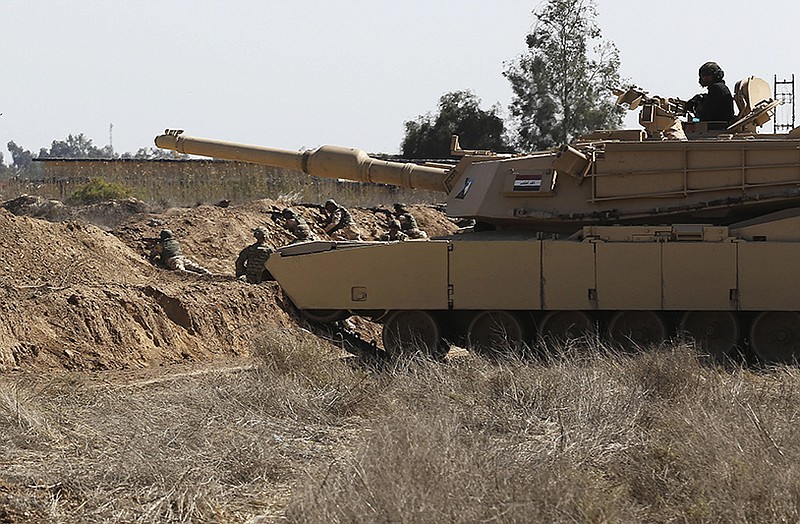TAJI, Iraq (AP) - As the U.S. mission to Iraq expands, so do its efforts to arm and train the country's security forces to combat the Islamic State group, with large-scale operations continuing to recapture territory from the Sunni militants.
Hundreds of American advisers are working at the Camp Taji military base just north of Baghdad to train Iraqi forces on issues like weaponry and better coordination and integration of ground action with coalition airstrikes.
The goal, U.S. military officials say, is to teach the different divisions of the Iraqi military how to harmonize the operations of its various fighting units.
"This Iraqi commander ... has a company worth of infantry soldiers, he's got some armor assets from the Iraqi army, he's got two helicopters that are flying ... and then he's got engineers and (explosive ordinance disposal)," said Maj. Russell Wagner, one of the U.S. officers conducting training.
They "are all out here working in unison in order to get him through this obstacle and into the town that lies beyond," Wagner said.
In November, President Barack Obama authorized the deployment of up to 1,500 more American troops to bolster Iraqi forces, which could more than double the total of U.S. forces to 3,100. The boost in advisers and trainers complements the air campaign launched by the U.S. in August 2014.
The Iraqi military has struggled to recover from its collapse in June when the Islamic State group captured country's second-largest city, Mosul, and swept over much of northern Iraq. In the face of the advance, commanders disappeared. Pleas for more ammunition went unanswered. In some cases, soldiers stripped off their uniforms and ran.
Twelve U.S. advisory teams had been operating in Iraq since August, stationed in joint operations centers in Baghdad and Irbil, as well as in some of the outer provinces, including volatile Anbar province, which has been under partial control of the militant group since early 2014.
The Iraqi military - backed by at least 20,000 Shiite militiamen - is fighting to regain control of Saddam Hussein's hometown of Tikrit, one of several predominantly Sunni towns to fall to the militants last year. It's one of the first major operations in which the U.S.-led coalition is not taking part, with U.S. officials saying they weren't ask to participate. Iranian advisers have played a prominent role on the front lines of Iraq's Salahuddin province.
If Iraqi forces are unable to push IS back and recover lost territory, Obama would be faced with a choice of accepting failure in Iraq or committing U.S. combat troops - something both U.S. and Iraqi officials have spoken firmly against.
"The soldiers now are absolutely eager to learn, their leaders eager to learn," said Lt. Col. John Schwemmer of the 5th Squadron, 73rd Calvary. "They are eager to get on the training lanes that we have here, to learn the skill they need to go against the enemy."
At the Salahuddin command center at Tikrit University, ambulances come and go with a handful of Iraqi soldiers, injured in clashes with the Islamic State group. Operations to recapture Tikrit have been on hold for nearly a week, with Iraqi officials saying they're trying to minimize casualties by not rushing the final assault.
At the provincial military headquarters, Iraqi soldiers sleep four to a room and pass the downtime by playing backgammon or volleyball - no soccer fields are available - or by listening to music.
Many of the young men fighting alongside the Shiite militias, known locally as Popular Mobilization Units, joined the battle last year when Iraq's most revered Shiite cleric, Grand Ayatollah Ali al-Sistani, called upon Iraqis to defend their nation.
While the U.S. has been working to train Iraqi military brigades, it has not worked with the militias, since doing so would bring them uncomfortably close to Iran, which offers significant assistance to the various militias.

